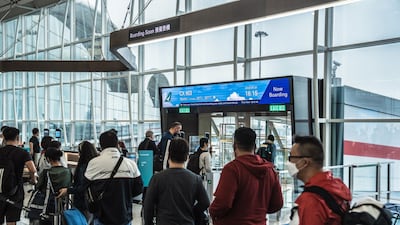Airline customers are more satisfied with service levels than they were before the onset of the Covid-19 pandemic despite the flight delays and cancellations that plagued carriers during summer due to staff shortages, a survey has found.
Passengers were more content in 2022, with 80 per cent declaring they were very satisfied or somewhat satisfied, compared with 75 per cent in 2019, according to a Global Passenger Survey by the International Air Transport Association (Iata).
Contentment levels dipped only slightly from the 82 per cent recorded in 2021, when governments were still imposing pandemic-related travel restrictions.
Still, the 2022 figure remains high when compared with satisfaction levels of about 75 per cent from 2017 through to 2019, the survey showed.
Travellers said they were most satisfied with bookings, the search for travel options and airport arrivals. Their biggest travel stress factors were flight transfers, border control delays, airport security and baggage collection, Iata said.
The global aviation industry is facing a shortage of employees, many of whom were laid off during the pandemic and have moved into other occupations or embraced more flexible work options, making it more difficult to rehire staff.
Airlines and airports are racing to find recruits to meet the rise in travel demand. However, the labour crunch has led to major disruptions over the busy summer travel season.
Two in five passengers have been discouraged from travelling due to immigration requirements, the survey said.
Process complexity was highlighted as the main deterrent by 65 per cent of travellers, with 12 per cent citing costs and 8 per cent citing the long time needed to complete visas.
Where visas are required, 66 per cent of travellers said they hoped to obtain a visa online before travelling, 20 per cent said they preferred to visit the consulate or embassy and 14 per cent hoped to get one at the airport.
_______________________
World's safest airlines 2022 — in pictures
_______________________
The majority of passengers (83 per cent) said they would share their immigration information to speed up the airport arrival process. While this is high, it is slightly down from the 88 per cent recorded in 2021.
Other traveller concerns were queuing times at airports during security, border controls and the process of boarding flights, the survey showed.
As for areas of improvement, 93 per cent of the polled passengers said they were interested in a trusted programme to expedite security screening.
Another 25 per cent said they would rather not queue up at the so-called air bridges before entering the plane while 20 per cent said they were interested in automated solutions designed to speed up control process.
In terms of baggage reclaim, two in five passengers reported having had their bags mishandled while one in five expressed dissatisfaction with the service provided.
“Travel during Covid-19 was complex, cumbersome and time-consuming due to government-imposed travel requirements. Post-pandemic, passengers want improved convenience throughout their trip,” said Nick Careen, Iata's senior vice president for Operations, Safety and Security.
“Digitalisation and use of biometrics to speed up the travel journey is the key.”
About 75 per cent of passengers expressed a keenness to use biometrics instead of passports or boarding passes, the survey showed.
In terms of greener travel, the survey found that there is a need to raise awareness on carbon offsetting as more than eight in 10 passengers do not offset their flight carbon emissions, Iata said.
The main reason was a lack of awareness, with 30 per cent saying they did not know about such an option, while 24 per cent said they did not like to use offsets and 18 per cent said they didn't have the option to do so.
Airlines are also facing pressure from environmental groups to lower their carbon footprint and to build back greener operations after the pandemic.

















